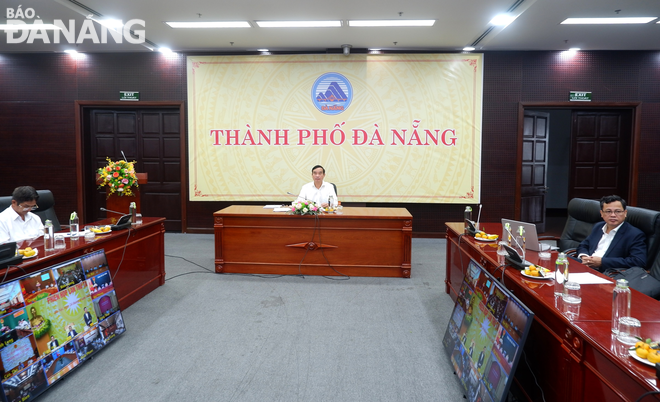Vietnamese ICT industry expected to earn $141bln in revenue in 2024
Prime Minister Pham Minh Chinh chaired the 8th meeting of the National Committee for Digital Transformation on Wednesday, which aimed to assess digital transformation efforts and development of the digital economy in recent times and discuss tasks and solutions for accelerating the work in 2024.
Chairman of the municipal People's Committee Le Trung Chinh presided the city's broadcasting bridge point.
 |
| Prime Minister Pham Minh Chinh chairing the meeting |
In his opening speech at the event, Prime Minister Pham Minh Chinh affirmed that 2024 was a breakthrough year in achieving the 5-year socio-economic development goal during the 2021-2025 period. The current focus task was to promote growth and economic restructuring, effectively exploit traditional growth drivers and promote new growth ones.
He also underlined the need to develop green economy, circular economy and digital economy; bolster national digital transformation; and build digital government, digital economy, digital society, and digital citizenship.
Special attention must be paid to implementing three strategic breakthroughs including building and improving institutions, including those related to digital transformation; training human resources, particularly high-quality personnel serving digital transformation; and developing infrastructure, including digital infrastructure, he added.
PM Chinh emphasised that digital transformation was a breakthrough and key task, and a top priority in implementing socio-economic development goals, especially reducing administrative procedures and cutting off compliance and travel costs for citizens and businesses.
He said the action plan for 2024 issued by the National Committee for Digital Transformation has identified the four pillars of the national digital transformation work, including the information technology industry, digitalisation of economic sectors, digital governance, and digital data, which are important drivers for rapid and sustainable socio-economic development.
He demanded members of the committee, as well as leaders of ministries, sectors, and localities, to report and evaluate national digital transformation efforts at the meeting, with specific evidence and statistics of what has been done, along with outstanding limitations, barriers, bottlenecks, and their causes.
 |
| Chairman of the municipal People's Committee Le Trung Chinh presided the city's broadcasting bridge point. |
The proportion of the national digital economy currently accounts for 16.5% of the economy, of which that of information technology industry (ICT) makes up over 60%.
ICT revenue in 2023 reached US$138.5 billion, down 4.46% against 2022. Of which, revenue from the hardware and electronics exports in 2023 stood at US$127 billion, a decline of 5% compared to 2022. However, the trade surplus in hardware and electronics last year still generated over US$30 billion.
About 45,500 IT firms are operating in the country, basically unchanged compared to 2022.
In 2023, Viet Nam had more than 1,500 digital technology businesses with revenue from foreign markets, an increase of more than 7% compared to 2022 with total revenue from foreign markets reaching US$7.5 billion, up 4%.
There are currently 1.5 million workers working in tech companies. 168 universities and 520 vocational schools offer training programmes in IT, electronics and telecommunications. The ICT major is also the technical industry with the highest number of enrollment targets with a total enrollment target of approximately 100,000/year.
The country’s ICT industry is expected to earn US$140 billion in 2024. There will be 48,000 digital technology enterprises (equivalent to a digital technology enterprise/2,000 people).
Last year, Da Nang synchronously deployed digital data initiatives, including issuing a data infrastructure development and management plan; and promulgate a list and roadmap for providing open data, and a list of shared databases.
The Da Nang Semiconductor and Artificial Intelligence Center for Research and Training (DSAC) was established, acting as a focal point to receive and open up more cooperation opportunities in the fields of IC, semiconductors and artificial intelligence between Da Nang, and domestic and foreign corporations and partners.
Recently, the municipal People's Committee issued a plan to implement digital transformation tasks in the city in 2024. Accordingly, Da Nang continues its digital transformation journey with the theme "Unlocking digital data, promoting digital economic growth and ensuring digital social security", with a focus on exploring new growth drivers, and creating conditions for IT businesses to develop many high-quality products.
Reporting by M.QUE - Translating by M.DUNG